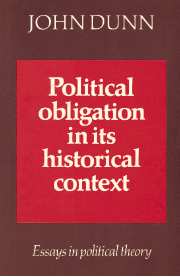Book contents
- Frontmatter
- Contents
- Preface
- 1 Introduction
- The historicity of the question
- The historicity of the answers
- 5 Practising history and social science on ‘realist’ assumptions
- 6 From democracy to representation: an interpretation of a Ghanaian election
- 7 ‘Hoc signo victor eris’: representation, allegiance and obligation in the politics of Ghana and Sri Lanka
- 8 Democracy unretrieved, or the political theory of Professor Macpherson
- 9 The success and failure of modern revolutions
- Conclusion
- Notes
- Index
6 - From democracy to representation: an interpretation of a Ghanaian election
Published online by Cambridge University Press: 22 August 2009
- Frontmatter
- Contents
- Preface
- 1 Introduction
- The historicity of the question
- The historicity of the answers
- 5 Practising history and social science on ‘realist’ assumptions
- 6 From democracy to representation: an interpretation of a Ghanaian election
- 7 ‘Hoc signo victor eris’: representation, allegiance and obligation in the politics of Ghana and Sri Lanka
- 8 Democracy unretrieved, or the political theory of Professor Macpherson
- 9 The success and failure of modern revolutions
- Conclusion
- Notes
- Index
Summary
When the electors of Asunafo constituency in the south of Ghana's Brong-Ahafo region went to the polls on 29 August 1969, they elected to Parliament a young secondary school teacher from a forest town in the constituency. When the new Busia government took office a month later, the representative of Asunafo became a Ministerial Secretary. By electing him the voters of this part of Ahafo certainly altered drastically the career of one young man and they contributed a seat to the massive governmental majority enjoyed by Dr Busia's Progress Party. What these twin effects were to amount to in future only time would tell: no study of an election could cast much light upon them. What studying elections may disclose is not an understanding of politics in general but simply an understanding of elections.
Elections are events which confuse in a very intimate and purposeful way the largely symbolic identifications of large numbers of people with their effects upon the politically effective conduct of rather small numbers of people. Such confusion is indeed their point. Their effect is to choose governments. The symbolic end of choosing governments in this way is, putatively, that governments so chosen will conduct themselves as more responsive agents of the purposes of their subject populations than governments chosen according to other fashions can be expected to do. Voting is a ritual of participation which purports to confer legitimacy upon the chosen.
- Type
- Chapter
- Information
- Political Obligation in its Historical ContextEssays in Political Theory, pp. 112 - 156Publisher: Cambridge University PressPrint publication year: 1980



